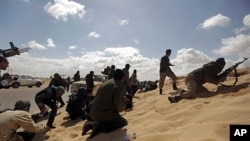Libyan rebels are taking advantage of the international assault on the government's military positions, reclaiming territory lost over the past 10 days.
Libyan opposition forces celebrated the allied military action, which cleared the highway south of the rebel stronghold of Benghazi. It was part of assaults, that also included setting up a no-fly zone to protect Libyan civilians from government forces.
After regrouping Monday, the rebels pushed back against troops loyal to leader Moammar Gadhafi, and were moving on the next major town, Ajdabiya, where government positions came under attack early in the day.
But opposition sources in the western town of Misrata said government troops continue to encircle the town, using civilians as a shield against any attack by foreign forces. Their accounts could not be independently verified.
In the capital Tripoli, pro-Gadhafi forces were inspecting damage inflicted on their leader's Bab al Aziziya compound the evening before.
Speaking by phone from Tripoli, Saleh Ibrahim, dean of the government-run Postgraduate Studies Academy, decried the missile attack.
Ibrahim says that Libyans believe it was outside the scope of the U.N. Security Council resolution authorizing force to establish the no-fly zone. Ibrahim contends the assault has "targeted" civilians.
It was not clear whether anyone was hurt in the attack on the Gadhafi compound. But Libya's government has said dozens of people have been killed since coalition air and missile strikes, led by the United States, Britain and France, began Saturday.
General Carter Ham, head of the U.S. Africa command, said the coalition was very conscientious about limiting civilian casualties.
The Libyan claims could not be independently verified, but they prompted some to raise concerns about the mission.
German Foreign Minister Guido Westerwelle spoke Monday as European Union officials were meeting in Brussels. "This does not mean that we are neutral. This does not mean that we have any sympathy with the dictator Gadhafi. But it means that we see the risks, and when we listen closely to what the Arab League yesterday said, unfortunately, we see that we had reasons for our concern," he said.
Westerwelle was referring to worries raised by Arab League chief Amr Moussa, who said Sunday that military actions have gone beyond the no-fly zone he says was envisioned. Moussa appeared to retreat somewhat from that criticism in a meeting Monday with U.N. Secretary-General Ban Ki-moon.
Talking to reporters in Cairo, Ban said it is important the international community speak with one voice. "The support of the Arab League figured prominently in the Security Council's adoption of a historic Security Council resolution authorizing the use of all necessary measures to protect civilians and save lives, including a no-fly zone," he said.
Pro-Gadhafi supporters in Cairo showed their displeasure with the international assault, harassing the U.N. chief during a visit to Tahrir Square.
He had just left the nearby Arab League headquarters, where regional leaders have walked a fine line in their dealings with Libya. There is little affection among them for Colonel Gadhafi, but international action against a long-ruling autocrat has left many in the Arab world unsettled.
Some observers are not surprised by the ambivalence shown.
"We cannot expect the League of Arab States to not issue a statement condemning the killing of Arab civilians. The important fact here is that all the reports about the number of civilians falling dead due to the air strikes is actually coming from Libyan national television, which has proved zero credibility over the past crisis," he said.
Akl believes that Arab League members trying to distance themselves from the campaign may review their position once more facts come out.
Also Monday, the Libyan government released four journalists from The New York Times . The four went missing last Tuesday. Libya's government later said the four were in its custody, and accused them of entering the country illegally.
In pictures: Conflict and Chaos in Libya




